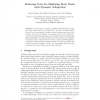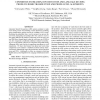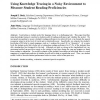1130 search results - page 127 / 226 » Emotion recognition using imperfect speech recognition |
ICPR
2006
IEEE
15 years 11 months ago
2006
IEEE
Coarticulation is one of the important factors that makes automatic sign language recognition a hard problem. Unlike in speech recognition, coarticulation effects in sign language...
CHI
2004
ACM
15 years 10 months ago
2004
ACM
Facial affect (or emotion) recognition is a central issue for many VMC and naturalistic computing applications. Most computational models assume "categorical perception"...
ERCIMDL
2007
Springer
15 years 4 months ago
2007
Springer
Abstract. Optical music recognition (OMR) enables librarians to digitise early music sources on a large scale. The cost of expert human labour to correct automatic recognition erro...
ICASSP
2008
IEEE
15 years 4 months ago
2008
IEEE
Automatic Speech Recognition (ASR) systems continue to make errors during search when handling various phenomena including noise, pronunciation variation, and out of vocabulary (O...
AIEDU
2006
14 years 10 months ago
2006
Constructing a student model for language tutors is a challenging task. This paper describes using knowledge tracing to construct a student model of reading proficiency and validat...



